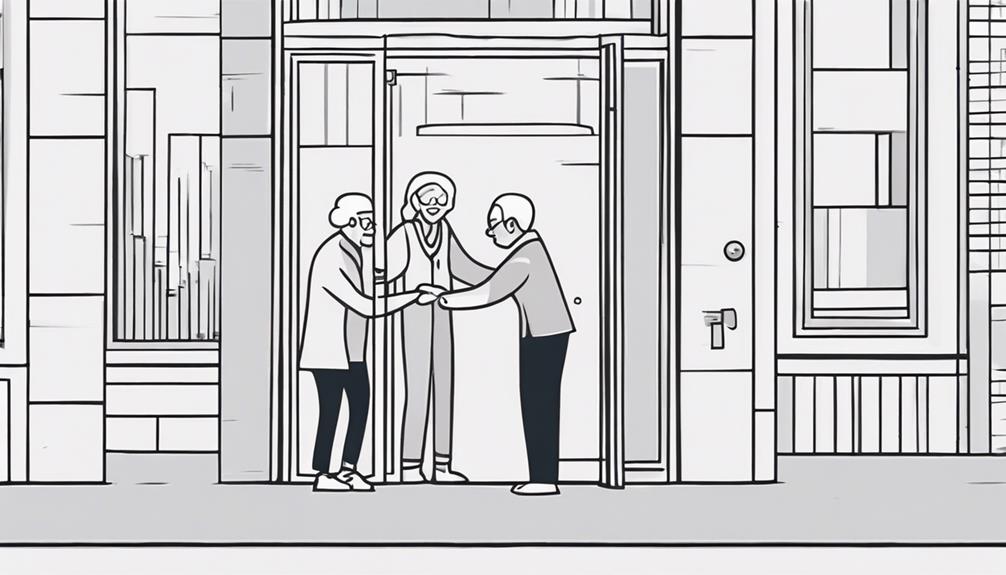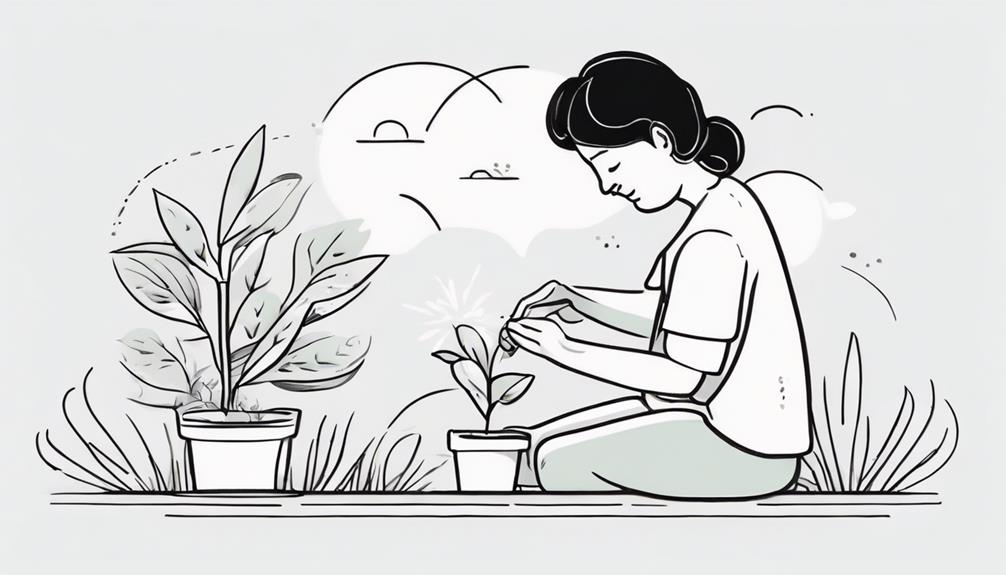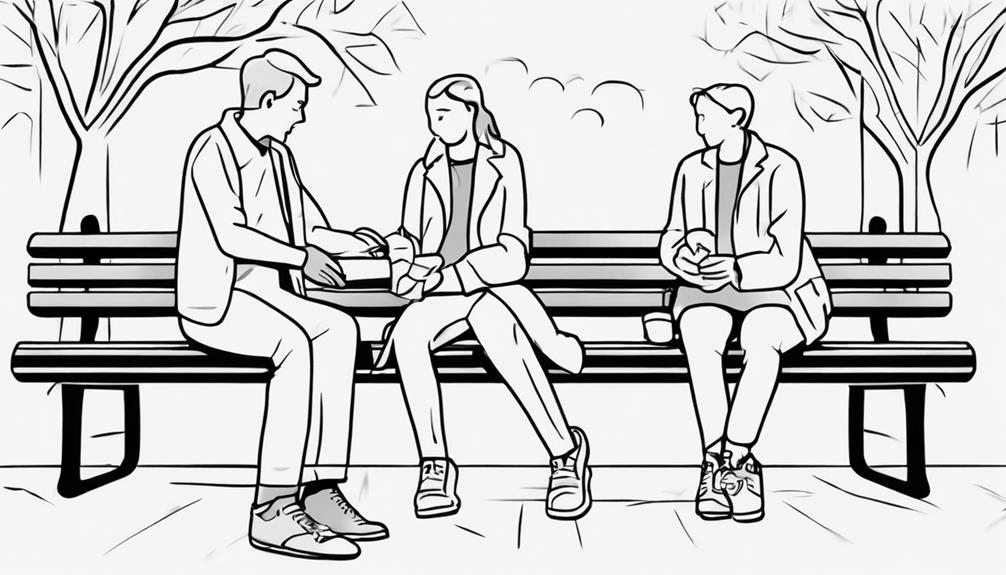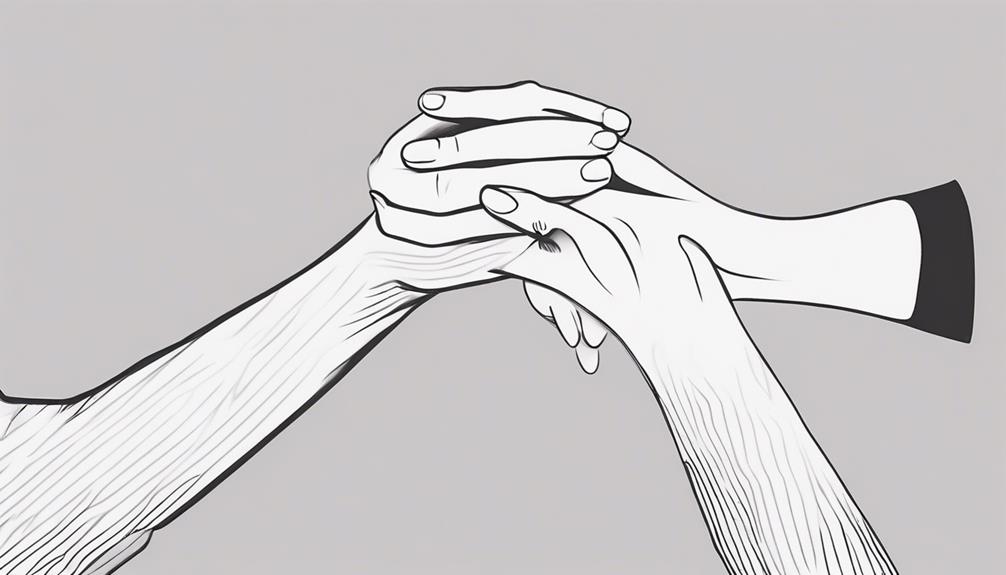Kindness is often viewed as a fundamental aspect of human interaction, but what does it truly mean to be kind? Exploring the intricacies of kindness entails dissecting the motivations, intentions, and outcomes associated with acts of benevolence. By unraveling the layers of kindness, we uncover a nuanced understanding that transcends mere surface-level gestures. Join the discourse as we delve into the depths of kindness and unravel its complexities to reveal the profound impact it has on both individuals and society as a whole.
Key Takeaways
- Kindness involves being friendly, generous, and empathetic towards others.
- Acts of kindness create positive ripple effects and inspire benevolence in the community.
- Being kind boosts emotional well-being by reducing stress and fostering positive emotions.
- Cultivating kindness leads to improved relationships, well-being, and a more compassionate society.
The Definition of Kindness

Kindness, in its essence, can be defined as the quality of being friendly, generous, and considerate in interpersonal interactions. It involves taking the time to understand others, accepting their flaws, and showing empathy towards their struggles. Kindness is not merely about being nice; it requires a genuine effort to make a positive impact on the entire community. This virtue acknowledges that individuals may make mistakes, but it emphasizes offering support and compassion rather than judgment. Acts of kindness extend beyond superficial gestures; they encompass a deep-rooted desire to uplift others and create a more harmonious society. By demonstrating grace and thoughtfulness in our interactions, we contribute to the well-being of those around us and foster a sense of unity within the community. Kindness, therefore, plays a crucial role in promoting understanding, acceptance, and emotional support among individuals, leading to a more compassionate and connected society.
Acts of Kindness
Engaging in acts of kindness has been shown to have a positive impact on both the giver and the recipient, fostering a sense of connection and compassion within communities. When individuals actively engage in acts of kindness, they contribute to a more empathetic and supportive society. Here are four examples of simple yet impactful acts of kindness:
- Smiling at someone else: A genuine smile can brighten someone's day, create a sense of warmth, and break down barriers between individuals.
- Giving a sincere compliment: Offering praise or recognition can uplift someone's spirits, boost their self-esteem, and promote positive social interactions.
- Holding the door open: This small gesture demonstrates courtesy, respect, and consideration for others, enhancing a sense of community and shared responsibility.
- Sticking up for someone who is being bullied: Intervening in situations of injustice requires courage and compassion, sending a powerful message that kindness prevails over cruelty.
Impact of Kindness

Kindness yields positive ripple effects that can extend beyond the initial act, influencing individuals and communities positively. The impact of kindness on emotional well-being is significant, promoting feelings of happiness, connectedness, and fulfillment. Examining the repercussions of kindness can provide insights into the profound effects it has on societal dynamics and individual mental health.
Positive Ripple Effects
Demonstrating acts of kindness initiates a cascade of positive repercussions that permeate through individuals and communities, fostering a culture of compassion and support.
- Influence: Kindness has the power to influence others to also act kindly, creating a ripple effect of positivity.
- Chain Reaction: Small acts of kindness can lead to larger positive changes in communities as they spark a chain reaction of goodwill.
- Positive Impact: The impact of kindness extends beyond individuals, inspiring a domino effect of benevolence and altruism.
- Community Building: Demonstrating kindness uplifts spirits, improves relationships, and fosters a sense of community among people, creating a harmonious environment for all.
Through these mechanisms, acts of kindness not only spread positivity and hope but also contribute to building stronger, more interconnected communities.
Emotional Well-Being Benefits
Research findings consistently demonstrate the significant impact of acts of kindness on emotional well-being, highlighting physiological and psychological benefits that contribute to overall health and happiness. Kindness boosts oxytocin levels, known as the 'love hormone,' fostering feelings of love and connection. Additionally, engaging in kind behaviors triggers the release of endorphins, the body's natural painkillers, resulting in a 'helper's high' and increased well-being. By reducing cortisol levels, the stress hormone, acts of kindness lead to decreased stress and anxiety. Studies have also linked kindness to improved cardiovascular health, showing that being kind can lower blood pressure and enhance heart health. Overall, practicing kindness enhances emotional well-being by cultivating positive emotions, gratitude, and a sense of purpose in life.
Benefits of Being Kind
Numerous studies have demonstrated the positive impacts of practicing kindness on various aspects of individual well-being and health. When we consider what it means to be kind and the change we wish to see in someone else, it becomes evident that the benefits of being kind extend beyond just the recipient of the kindness. Here are four significant benefits of practicing kindness:
- Increased Happiness and Well-Being: Kindness has been linked to higher levels of happiness and an overall sense of well-being.
- Stress Reduction: Acts of kindness can help reduce stress, anxiety, and symptoms of depression, promoting mental health.
- Improved Relationships: Kindness strengthens relationships and fosters social connections, leading to a more fulfilling social life.
- Enhanced Physical Health: Engaging in kind actions has been associated with improved physical health, including reduced blood pressure and better heart health.
Kindness in Relationships

Kindness in relationships plays a crucial role in fostering emotional bonds and creating a supportive environment. Loving gestures, empathy, and understanding are key components that contribute to the fabric of healthy relationships. By practicing kindness in interactions, individuals can enhance communication, build trust, and promote positive conflict resolution.
Loving Gestures in Relationships
Demonstrating loving gestures, such as surprise gifts, notes, or acts of service, plays a crucial role in fostering a deep sense of connection and appreciation within relationships. These gestures go beyond mere actions; they symbolize care, thoughtfulness, and investment in the relationship. Here are four essential components of loving gestures in relationships:
- Thoughtful Surprises: Unexpected gifts or gestures tailored to your partner's preferences show attentiveness and consideration.
- Heartfelt Notes: Handwritten messages expressing love and gratitude can strengthen emotional bonds and create lasting memories.
- Acts of Service: Helping with daily tasks or responsibilities demonstrates commitment and support for your partner's well-being.
- Quality Time: Spending meaningful time together, engaging in shared activities, and creating new experiences deepen intimacy and connection.
Empathy and Understanding
Empathy and understanding are foundational elements in cultivating meaningful and harmonious relationships, fostering connection and compassion through shared emotional experiences and perspectives. Empathy involves the ability to recognize and share the feelings of others, creating a sense of vulnerability and openness within relationships. Understanding, on the other hand, requires actively listening and empathizing with the other person's point of view, establishing a connection based on mutual respect and support. By demonstrating empathy and understanding, individuals can strengthen their bonds, enhance trust, and create a supportive environment for growth and development. This compassionate approach not only improves communication and conflict resolution but also contributes to the overall well-being of all parties involved, promoting healthier and more fulfilling relationships.
Cultivating Kindness Daily
Consistently engaging in acts of kindness on a daily basis has been shown to have profound positive effects on both individuals and their surrounding communities. When individuals make kindness a daily practice, they not only benefit themselves but also contribute to a more compassionate society. Here are four key aspects to consider when cultivating kindness daily:
- Daily practice: Making kindness a daily habit involves consciously choosing to act with compassion and empathy in all interactions, whether big or small.
- Kindness habits: By incorporating kindness into daily routines, individuals can reinforce positive behavior and make it a natural response to others' needs.
- Small gestures: Simple acts of kindness, such as holding the door for someone or offering a genuine compliment, can have a significant impact on someone's day and foster a sense of connection.
- Ripple effect: Engaging in acts of kindness regularly can create a ripple effect, inspiring others to also spread kindness in their daily lives, thus amplifying the positive impact on the community.
Kindness and Empathy

Understanding the intrinsic connection between kindness and empathy is essential for cultivating a more compassionate and interconnected society. Empathy, the ability to understand and share the feelings of others, is a fundamental aspect of kindness. When individuals practice empathy, they can connect on a deeper level, leading to more compassionate responses and actions. Kindness, on the other hand, involves considering the perspectives and emotions of others, fostering connections and building relationships based on understanding and support.
| Empathy and Compassion | Kindness and Connection |
|---|---|
| Ability to understand and share others' feelings | Involves considering others' perspectives and emotions |
| Allows for deeper connections and compassionate responses | Fosters connections and relationships based on understanding |
Understanding emotions plays a critical role in both empathy and kindness. By recognizing and acknowledging the emotions of others, individuals can respond with empathy and kindness, creating a positive impact on relationships and community dynamics. Cultivating empathy is key to fostering an inclusive and supportive environment where understanding and compassion thrive.
Spreading Kindness Ripple Effect
Spreading kindness creates a ripple effect that inspires positive behaviors and fosters a culture of compassion within communities. This phenomenon is driven by the interconnected nature of human interactions, where one act of kindness can set off a chain reaction of goodwill. Here are four key aspects of the ripple effect of kindness:
- Kindness challenges: Acts of kindness challenge individuals to step out of their comfort zones and extend compassion towards others, breaking down barriers and fostering connections.
- Random acts: Even small, seemingly random acts of kindness can have a significant impact on both the giver and the recipient, creating a ripple effect that spreads positivity throughout the community.
- Spreading joy: Kindness not only brings joy to the recipients but also to those who witness or are inspired by these acts, leading to an amplification of positive emotions and behaviors.
- Cultural impact: The cumulative effect of kindness within a community can shape its culture, promoting empathy, support, and a sense of belonging among its members.
Encouraging Kindness in Others

To foster a culture of compassion and kindness in others, it is essential to lead by example through consistently modeling kind behavior oneself. Recognizing and praising acts of kindness in others can reinforce positive behavior. Engaging in conversations about the importance of kindness and its impact on people's lives can also encourage others to be kind. Providing opportunities for individuals to participate in acts of kindness helps to cultivate a culture of compassion. Supporting and empowering individuals to make a difference through small acts of kindness in their daily lives is crucial in encouraging kindness in others.
| Kindness Challenges | Kindness Campaigns | Kindness Workshops |
|---|---|---|
| Challenging individuals to perform daily acts of kindness | Initiatives promoting kindness in communities | Workshops focusing on empathy and compassion |
| Setting kindness goals for personal growth | Social media campaigns advocating for kindness | Training sessions on effective communication and conflict resolution |
| Encouraging random acts of kindness | Collaborative projects promoting kindness in schools or workplaces | Skill-building workshops on active listening and perspective-taking |
Frequently Asked Questions
What Does It Mean for Someone to Be Kind?
In exploring the concept of being kind, it pertains to the demonstration of empathy, compassion, and consideration towards others. Kindness, distinct from mere generosity, manifests through altruistic acts aimed at helping and supporting others. It plays a pivotal role in nurturing positive relationships and fostering harmonious interactions. Understanding the essence of kindness in relationships underscores the significance of respect, dignity, and understanding in all interpersonal dealings.
What Does It Mean to Be Very Kind?
Genuine compassion, selfless acts, empathy, and understanding are key attributes of individuals who are very kind. Such individuals consistently prioritize the needs and well-being of others, demonstrating a profound sense of care and empathy through their actions. They go above and beyond to support and uplift those around them, inspiring others to follow their lead in creating a more compassionate world. Their unwavering dedication to spreading kindness sets a powerful example for fostering positive connections and relationships.
What Is the Meaning of Kind Person?
A kind person embodies qualities of generosity, empathy, and compassion. Generosity involves a willingness to give without expectation of return. Empathy allows one to understand and share the feelings of others, fostering a deeper connection. Compassion drives individuals to act with kindness and understanding towards those in need. Together, these traits form the foundation of a kind person, someone who selflessly cares for the well-being and happiness of others.
What Does It Mean to Become Kind?
Kindness in action encompasses cultivating compassion through empathy and altruism. It involves engaging in behaviors that demonstrate genuine care, understanding, and support towards others. By actively choosing to prioritize the well-being and happiness of those around us, we contribute to fostering a more empathetic and inclusive society. Being kind means embodying a mindset of generosity and consideration in our interactions, ultimately creating positive impacts on individuals and communities.
Conclusion
In conclusion, kindness serves as a beacon of light in a world often shrouded in darkness. It embodies the power of compassion, empathy, and connection, fostering a sense of unity and understanding among individuals. Like a gentle ripple in a vast ocean, acts of kindness can create waves of positivity that reach far beyond their initial impact. Embracing kindness as a way of life not only benefits others but also enriches our own existence, creating a more harmonious and compassionate society.
